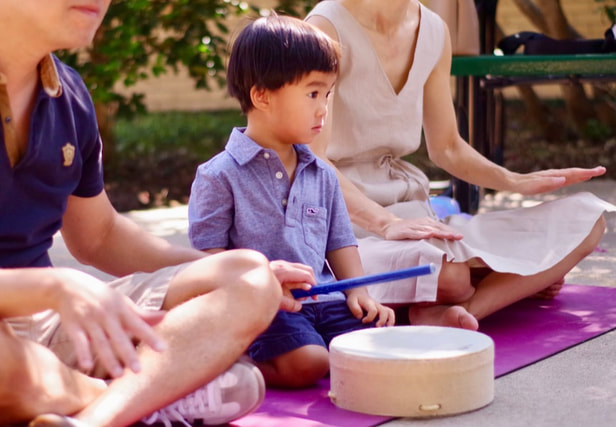“Kodomo” is the Japanese word for "Children."
Kodomo Music is a weekly class for children ages 18 months up to 4 years old that combines the use of the Suzuki repertoire with musical awareness, pitch, rhythm and movement activities.
Kodomo Music is an excellent preparation for instrument study and helps the child to respond in a group situation, follow musical instructions and enjoy music with their family and friends.
Kodomo Music also helps children develop social skills like sharing, taking turns, listening while others play and being a good audience member. When the child is comfortable this is also a great first step to becoming a confident performer!
Live piano accompaniment provides a dramatic and spontaneous backdrop for the exploration of musical skills. Improvisation and free expression encourage children to use their whole bodies to experience musical concepts like high and low, soft and loud, and slow and fast.
- Kodomo Music does not emphasize performance.
- Everyone is invited to join in the fun or watch quietly from their parent’s lap.
- Our goal is to create a joyous environment where families can create and share musical fun.
This course can be taken multiple times as it becomes more beneficial as the child develops. Each semester features its own new content and songs.
Many of our younger students (infants and toddlers) start with our unique Kodomo program. Kodomo is SMID’s proprietary introduction-to-music program for young children not quite ready to handle an instrument.
It’s a great way for new families to have fun with their children in a group setting and begin to learn more about the SMID program. Kodomo children are often well prepared to begin instrument lessons and a lifetime of music appreciation.
Kodomo Music is a weekly class for children ages 18 months up to 4 years old that combines the use of the Suzuki repertoire with musical awareness, pitch, rhythm and movement activities.
Kodomo Music is an excellent preparation for instrument study and helps the child to respond in a group situation, follow musical instructions and enjoy music with their family and friends.
Kodomo Music also helps children develop social skills like sharing, taking turns, listening while others play and being a good audience member. When the child is comfortable this is also a great first step to becoming a confident performer!
Live piano accompaniment provides a dramatic and spontaneous backdrop for the exploration of musical skills. Improvisation and free expression encourage children to use their whole bodies to experience musical concepts like high and low, soft and loud, and slow and fast.
- Kodomo Music does not emphasize performance.
- Everyone is invited to join in the fun or watch quietly from their parent’s lap.
- Our goal is to create a joyous environment where families can create and share musical fun.
This course can be taken multiple times as it becomes more beneficial as the child develops. Each semester features its own new content and songs.
Many of our younger students (infants and toddlers) start with our unique Kodomo program. Kodomo is SMID’s proprietary introduction-to-music program for young children not quite ready to handle an instrument.
It’s a great way for new families to have fun with their children in a group setting and begin to learn more about the SMID program. Kodomo children are often well prepared to begin instrument lessons and a lifetime of music appreciation.

Just some of the many skills gained in Kodomo:
Benefits of early childhood music for brain development :
- Language Development
Dr. Kyle Pruett, clinical professor of child psychiatry at Yale School of Medicine (and a musician) says “Language competence is at the root of social competence. Musical experience strengthens the capacity to be verbally competent.”
- Brain Development
A study led by Ellen Winner, professor of psychology at Boston College, and Gottfried Schlaug, professor of neurology at Beth Israel Deaconess Medical Center and Harvard Medical School, found changes in the brain images of children who underwent fifteen months of weekly music instruction and practice. Music is also shown to increase spatial- temporal skills in children. These skills are important for solving multi-step problems in areas such as math, engineering and computer science.
- IQ
A study from the University of Toronto, published in 2004 in Psychological Science, showed an average increase of three IQ points in young children studying music over their non-musical peers.
- Happiness!
Children love making music and engaging with them in their happiness is reason enough!
- Increased body awareness and movement
- Gross and fine-motor skills and coordination
- Following and keeping a steady beat
- Recognizing musical concepts such as tempo (fast/slow) and pitch (high/low)
- Increased abilities to memorize, follow patterns and anticipate
- Following a leader and physically responding to musical cues
- Increased social skills like sharing, taking turns, waiting and impulse control
Benefits of early childhood music for brain development :
- Language Development
Dr. Kyle Pruett, clinical professor of child psychiatry at Yale School of Medicine (and a musician) says “Language competence is at the root of social competence. Musical experience strengthens the capacity to be verbally competent.”
- Brain Development
A study led by Ellen Winner, professor of psychology at Boston College, and Gottfried Schlaug, professor of neurology at Beth Israel Deaconess Medical Center and Harvard Medical School, found changes in the brain images of children who underwent fifteen months of weekly music instruction and practice. Music is also shown to increase spatial- temporal skills in children. These skills are important for solving multi-step problems in areas such as math, engineering and computer science.
- IQ
A study from the University of Toronto, published in 2004 in Psychological Science, showed an average increase of three IQ points in young children studying music over their non-musical peers.
- Happiness!
Children love making music and engaging with them in their happiness is reason enough!
|
|